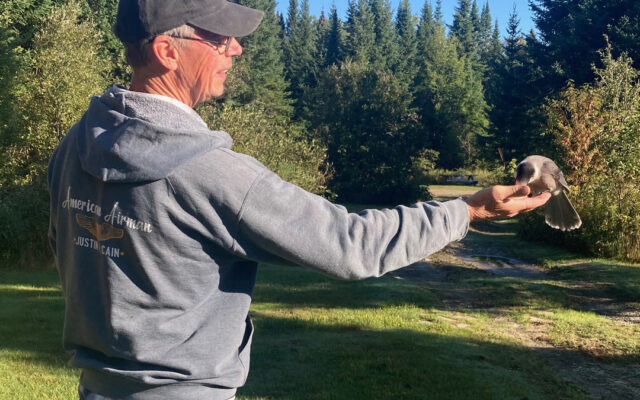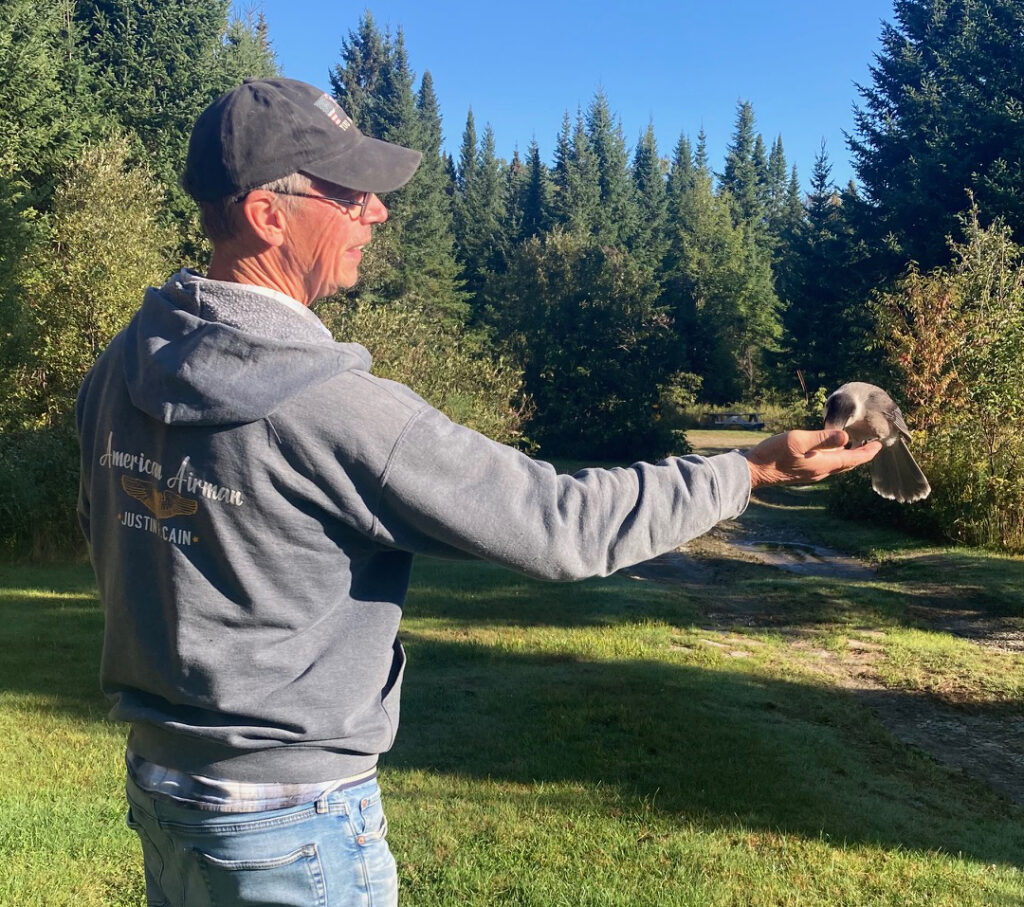
This North Woods bird will eat right out of your hand
By V. Paul Reynolds
Most of us who have ever camped for long in the big woods, have come to know the Canada Jay. This charismatic bird has more aliases than a Kansas outlaw: Gray Jay, Whiskey Jack, Gorby and Camp Robber.
These sociable creatures, next to a hummingbird, are, to me, the most interesting of all winged critters. They are non-migratory, a part of the crow family and can live up to 18 years. Somewhat tame and very inquisitive, the Gorby likes to stay in familiar surroundings. It gets through the long winters in the coniferous forest by stashing food in various places, demonstrating incredible resourcefulness. Naturalists speak of the bird’s amazing cleverness when it comes to caching food.
Canada Jays are also known to mimic the calls of other bird species.

SHARING A SNACK — Camper Mark Cain shares his hot dog roll with a hungry Gorby at Big Bog Brook.
A well-known story tells of a researcher who buttered slices of bread and tossed them to a pair of Canada Jays on a frigid winter day. Instead of eating the bread, the jays stuffed the slices under tree bark and into spruce boughs, each cache marked with a dab of sticky saliva. Weeks later, when the woods were deep in snow and food scarce, the birds returned to those hidden spots and dined on the frozen buttered bread — a feat of memory and resourcefulness that’s legendary among boreal birders.
Among the Cree and other Native Americans, the Canada Jay was sometimes seen as a trickster but also as a messenger of good fortune. One Cree elder recounted how, when hunters were lost in the bush, a Canada Jay often appeared, scolding and flitting ahead. The hunters followed, and more often than not, the bird’s flight led them back toward camp or a river. Because of this, some Indigenous hunters believed feeding a Whisky Jack would bring luck, and to kill one was to risk misfortune on the hunt.
Hunters and loggers in the North Country often called the Canada Jay the “camp robber” for good reason. The birds quickly learn that humans mean food, and they’re fearless about stealing it.
There’s an old story of a trapper who left his flapjacks cooling on a log, only to return and find a Canada Jay happily flying off with one nearly its own size. Another trapper swore he watched a jay carry off his plug of chewing tobacco, though nobody could say what the bird did with it. The lesson in both tales: If you turn your back on your lunch in the woods, the Whisky Jack may beat you to it.
A number of years ago, while camping at Baxter State Park, my late brother-in-law was cooking an elaborate outdoor breakfast of steak and eggs. Out of nowhere, a Gorby flew down from a branch, picked up a small tenderloin medallion, and flew back up to an overhanging branch. Displeased by the theft, my brother-in-law, who was a high school baseball coach, flung a rock up at the Gorby. Plunk. To my disbelief, the Gorby took the full brunt of the projectile, keeled over, and dropped the stolen meat. My brother-in-law caught the meat and went back to preparing his breakfast. True story.
Myth has it that, on more than one occasion, turned-around hunters have found their way back to camp by following a flitting Canada Jay, which may explain why, to this day, some hunters carry a crust of bread in their hunting jackets just in case they find themselves in need of the “gray guardian.”
Recently, while moose scouting and camping in the North Woods, Mark Cain and I got acquainted with a trio of Gorbies that hung around camp for three days. Mark, a bird lover fascinated by the intelligence of crows, fed the camp visitors a whole package of hot dog rolls, piece by piece.
If you are a big woods camper, you, too, surely have Gorby experiences worth sharing. They are special, aren’t they?
The author is editor of the Northwoods Sporting Journal. He is also a Maine Guide and host of a weekly radio program “Maine Outdoors” heard Sundays at 7 p.m. on The Voice of Maine News-Talk Network. He has authored three books. Online purchase information is available at www.sportingjournal.com, Outdoor Books.